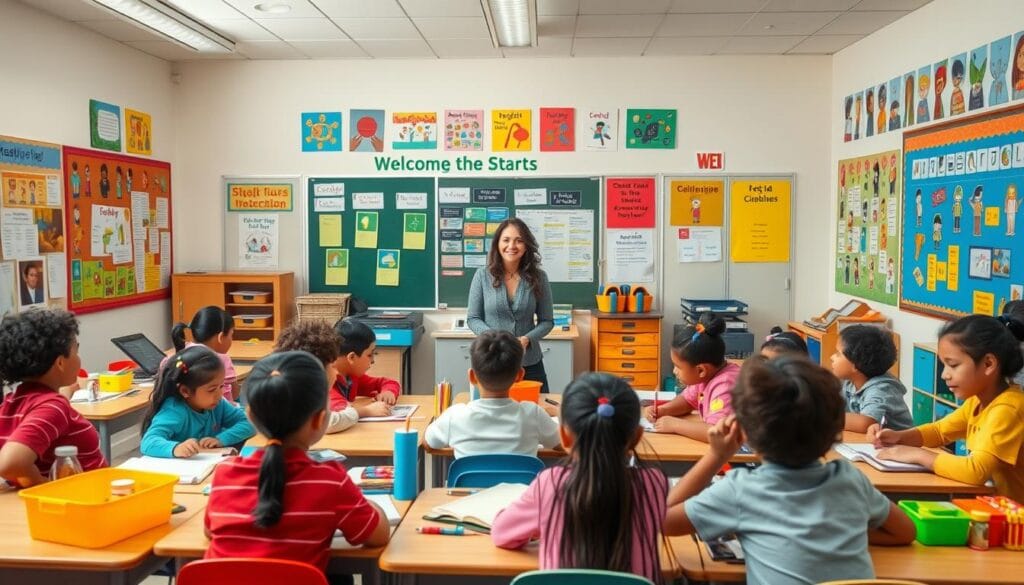Essential Skills to Develop at Home for Student Success
As a student, your success in school depends a lot on what you learn at home. By focusing on key skills and habits, you can reach your highest potential. This article will show you how to improve your learning at home.
فهرس المقالة
Understanding the Foundation of Academic Success at Home
Achieving academic success is more than just going to school. It starts with building a strong foundation at home. This foundation helps you grow and develop. Let’s explore the key elements for success in your educational journey.
Creating an Effective Learning Environment
Having a dedicated learning space at home can greatly improve your grades. Find a quiet, well-lit area with no distractions. Make sure your workspace is organized and has all the school supplies you need.
Setting Clear Academic Goals
Setting goals is a powerful way to succeed academically. Think about your strengths, interests, and areas to improve. Set specific, measurable, and achievable goals that match your dreams. Regularly check your progress and make changes to stay motivated.
Establishing a Support System
Having a strong support system at home is crucial. Talk openly with your family and ask for their help and support. Also, connect with teachers, counselors, and friends to build a network that supports your learning and growth.
By creating a good learning environment, setting clear goals, and building a support network, you can set the stage for success. Use these strategies to reach your full potential and excel in your studies.
“The most valuable of all capital is that invested in human beings.” – Alfred Marshall
Time Management: The Cornerstone of Student Achievement

As a student, time management is key to your success. It keeps you organized and focused. It also helps you use your study time wisely, leading to better grades and more productivity.
Creating a structured schedule is a great way to manage your time. Start by listing your tasks and activities. Set aside specific times for studying, classes, and other activities. This helps you stay on track and avoid putting things off.
- Use a planner or calendar to plan your day and week.
- Try to cut down on time spent on social media or watching TV.
- Set achievable deadlines for your work and break it down into smaller tasks.
The Pomodoro method is another good technique. It involves working in 25-minute bursts, then taking a short break. This keeps your focus sharp and helps you get more done in less time.
“Time management is not just about getting more things done. It’s about getting the right things done.” – Rory Vaden
Good time management is more than just a schedule. It’s about discipline and knowing what to do first. By improving these skills, you can reach your academic goals more efficiently and confidently.
Mastering Active Reading and Comprehension Techniques
Improving your grades starts with active reading and understanding techniques. These strategies help you grasp and remember more, changing how you learn.
SQ3R Reading Method
The SQ3R method is a proven way to read better. It stands for Survey, Question, Read, Recite, and Review. It helps you dive into the text and remember important details.
First, survey the material to get a quick idea. Then, ask yourself questions to guide your reading. As you read, recite the main points and review them to solidify your understanding.
Annotation Strategies
Annotation is a key tool for active reading. It lets you mark important parts, note your thoughts, and create a personal guide. Try different methods like underlining, circling, and margin notes to see what works best for you.
Reading Retention Techniques
- Summarize key points: After reading, summarize the main ideas in your words. This strengthens your understanding and helps remember the information.
- Make connections: See how the content links to what you already know or other subjects. This makes it easier to recall and use the information.
- Engage in self-questioning: Stop and ask yourself questions about what you’ve read. This boosts your critical thinking and comprehension.
By learning these active reading and comprehension methods, you’ll achieve academic success. Use the SQ3R method, annotation, and retention techniques to improve your learning and excel in school.
Developing Effective Note-Taking Strategies
Mastering effective note-taking strategies is key for students aiming for academic success. It helps you engage with course material and improves your ability to retain information. This skill is essential for better study habits.
The Cornell System is a popular method. It divides your notes into three parts: main notes, a cue column, and a summary. This structure helps you spot key concepts, ask questions, and summarize easily. It boosts your understanding and recall.
The Outline Method is another effective strategy. It organizes your notes with headings, subheadings, and bullet points. This method works well for subjects like history or literature. It mirrors the information’s structure.
- The Cornell System: Divide your notes into three sections for efficient organization and review.
- The Outline Method: Use headings, subheadings, and bullet points to structure your notes for better understanding.
- The Mapping Technique: Create visual representations of the relationships between ideas and concepts.
- The Charting Approach: Arrange information in tables or charts to identify patterns and make connections.
Choosing the right note-taking strategy is crucial. It should match your learning style and the subject. By using effective note-taking strategies, you can improve your ability to retain information. This, in turn, enhances your study habits and academic performance.
| Note-Taking Strategy | Benefits | Best Suited For |
|---|---|---|
| Cornell System | Organized structure, easy review, and summarization | Lectures, textbook reading, and general note-taking |
| Outline Method | Clear hierarchical structure, identifying key concepts | Subjects with defined organizational structure (e.g., history, literature) |
| Mapping Technique | Visual representation of relationships, creative thinking | Brainstorming, problem-solving, and understanding complex concepts |
| Charting Approach | Identification of patterns, data organization | Subjects with numerical data or comparative information |

“Effective note-taking is not just about transcribing information; it’s about actively engaging with the material and making it your own.”
Essential Skills to Develop at Home for Student Success
To do well in school, students need to learn more than just classroom material. By practicing these skills at home, you can set yourself up for success. Let’s look at the key skills like digital literacy, self-management, and core competencies that are vital for students.
Core Academic Competencies
Being good at core subjects like math, language arts, science, and social studies is key. Improve your understanding through regular practice, tutoring, and educational resources. This will help you build a strong foundation for your studies.
Digital Literacy Skills
In today’s world, knowing how to use technology is crucial. Learn about productivity software, online tools, and how to work together online. These digital literacy skills will help you succeed in a tech-driven education system.
Self-Management Abilities
Good students know how to manage their time, set goals, stay organized, and control their emotions. Create schedules, focus on what’s important, and avoid distractions. Also, learn to handle stress and keep your studies and personal life balanced.
| Skill Category | Key Components |
|---|---|
| Core Academic Competencies |
|
| Digital Literacy Skills |
|
| Self-Management Abilities |
|
By working on these skills at home, you’ll be ready to succeed in school. Spend time and effort on these areas, and you’ll be on your way to student success.
Enhancing Critical Thinking and Problem-Solving Abilities
Learning more than just facts is key to doing well in school. Students need to improve their critical thinking and problem-solving skills. These skills are important for doing well in many subjects and facing real-life challenges.
Analytical Reasoning Methods
Analytical reasoning is the base of critical thinking. By learning deductive reasoning, inductive reasoning, and logical analysis, students can tackle complex problems. They can spot patterns and make solid conclusions. Doing puzzles or studying case studies can boost this skill.
Decision-Making Frameworks
Good decision-making is a sign of a successful student. Learning models like pros and cons analysis or the SWOT (Strengths, Weaknesses, Opportunities, Threats) framework, helps. These tools help students make smart choices in school and life. Using them in different situations sharpens this skill.
Creative Problem-Solving Approaches
Problem-solving also needs creativity and new ideas. Methods like brainstorming, mindmapping, and lateral thinking help find unique solutions. Encouraging students to think outside the box and explore new ideas is important.
By using these critical thinking and problem-solving methods, students can reach their full potential. They will gain skills for success in the long run.

Maintaining Organization and Academic Planning
Getting good grades is not just about studying hard. It also needs good organization techniques and academic planning. By using smart study organization methods, you can make your school life easier and reach your goals.
Creating a detailed study schedule is key to good planning. First, figure out what’s most important and split your work into smaller parts. Use a calendar or digital planner to plan your homework, deadlines, and study times. This helps you keep up with your school work.
Keeping your study stuff organized is also vital. Get good folders, binders, or digital tools to keep your notes and handouts in order. Make a system that fits how you learn best. This way, you can find what you need quickly.
- Make a special study area that helps you focus and be productive.
- Use checklists and to-do lists to keep track of your work and make sure you don’t miss anything.
- Update your study plan often to fit changes in school and your life.
By using these organization techniques and academic planning every day, you’ll feel more in control and confident in school. Remember, being organized in your studies can really help you do well in school.
Conclusion
Developing essential skills at home is key for student success. It starts with creating a good learning space and setting clear goals. Mastering reading and note-taking skills is also important.
Learning to manage time, think critically, and solve problems helps you succeed in school. These skills open doors to personal and professional growth. They set you up for a successful future.
The path to academic success is a journey. The skills you learn today will help you in school and beyond. Stay focused, work hard, and believe in your abilities. Your success starts at home, with endless possibilities ahead.
FAQ
What are the essential skills to develop at home for student success?
Key skills for student success include time management and active reading. Also, effective note-taking, critical thinking, and problem-solving are important. Self-discipline, study habits, and organizational techniques are crucial too.
How can I create an effective learning environment at home?
To set up a good learning space at home, pick a dedicated area for studying. Make sure it’s free from distractions. Also, have all the tools and resources you need.
Setting clear goals and having a supportive network helps too. This can boost your learning success.
Why is time management crucial for student achievement?
Time management is key for students to do well. It helps you focus on what’s important. By planning your time well, you can do more and achieve better grades.
How can I master active reading and comprehension techniques?
To get better at active reading, try the SQ3R method. It helps you survey, question, read, recite, and review your material. Also, use good annotation and retention techniques.
What are the benefits of developing effective note-taking strategies?
Good note-taking helps you remember more and study better. It makes your learning more efficient. Choose a method that fits your learning style and the subject.
What are the core skills I should develop at home for student success?
Focus on developing academic skills, digital literacy, and self-management. These skills are vital for your success in school.
How can I enhance my critical thinking and problem-solving abilities?
Improve your critical thinking by practicing analytical methods and decision-making. Try creative problem-solving too. These skills are important for both school and life.
What are some effective organization techniques for maintaining academic success?
To stay organized, manage your assignments well and plan your study time. Keep your schoolwork tidy. These habits help you stay focused and reach your goals.






